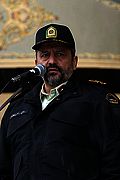Police Chief Recounts Events of Election Eve
» We Knew Beforehand
One year after the June 12, 2009 electoral coup, the head of the Islamic Republic’s law enforcement forces revealed that his organization had predicted the post-election events and that he had personally warned senior police chiefs to be prepared for the upheaval. But Ahmadi-Moghaddam also admitted that the police did not anticipate the scope of the popular protests that followed.
Repeating the claim that none of the post-election deaths were caused by law enforcement forces, the top cop said that no shooting took place at the Lolagar mosque and that Neda Agha-Soltan’s murder was staged and directed from the outside.
Speaking to the monthly Soroush, Iran’s police chief confirmed the validity of a video clip showing Basij forces and special guards attacking the Tehran university student dormitory in early morning hours of June 15, 2009. At the same time, he asked reporters not to focus excessively on the crimes committed at Kahrizak and the Tehran University dormitory. In his descriptions and presentation, he implied that it was the volunteer paramilitary Basij forces and not the police who were responsible for the attack on Tehran University’s dormitory. The request to enter Tehran University according to him was made by its president, Farhad Rahbar.
And despite the large number of casualties and arrests that have taken place in Iran since June 12, 2010, Ahmadi-Moghaddam gave his forces a mere “unsatisfactory” grade in handling the protests.
But, in perhaps his most significant remarks, the head of the Islamic republic’s law enforcement forces said that none of the ballot boxes were opened and counted until 11 pm on Friday, June 12.
However, the first reports of Ahmadinejad’s victory with claims of 24 million votes were released between 10:30 and 11pm on Friday, June 12 by website and news agencies such as Fars, IRNA (the Islamic Republic’s official news agency), and Rajanews.
Similarly, the Islamic republic television announced its first results based on 11 million counted votes at 11:30pm the same night. In light of Ahmadi-Moghaddam’s remarks, it is not clear how the interior ministry officials were able to count 11 million votes in less than half an hour.
In another segment of his remarks, Ahmadi-Moghaddam said, “One week before the election, I gathered the provincial governors here and told them that you will face crises until at least the first week of summer. I said the election would end in either Mr. Mousavi’s favor, in which case we would have one kind of crisis under the name of a victory celebration and there would be attempts to capture the next targets; or Mr. Ahmadinejad would win, in which case his opponents would claim fraud. Of course, we couldn’t accurately predict the extent of the problem, but we thought that we would certainly have problems and you must definitely be prepared.”
The head of the Islamic republic’s law enforcement forces, however, noted that “higher and more important decisions had to be taken by political leaders.”
In another part of his interview, the chief of police said that Iran did not have the necessary laws to regulate satellite receivers, the Internet and cyber space in general, adding that if, “Iran implemented similar laws to those that exist in the US, Britain, France and others, or implemented parts of it, there would be outcry that we are curtailing freedom of speech in Iran.” He added that he did not want any laws and regulations stricter than those that existed in the West and said that he would be happy with just 50 percent of those regulations.
Ahmadi-Moghaddam said that in a meeting with the supreme leader of the Islamic regime, the latter had told them that as a soldier they had to be ready for battle.


